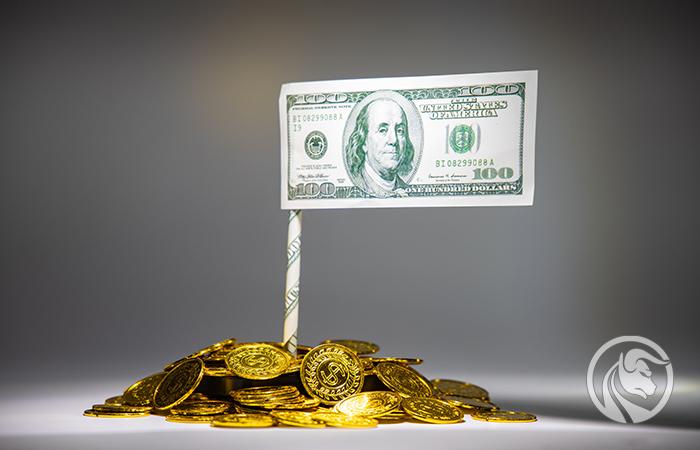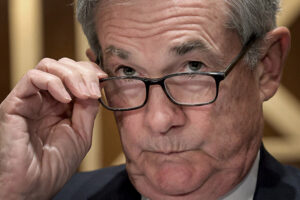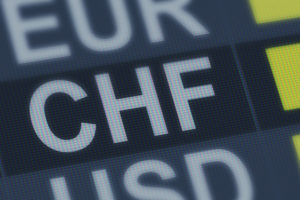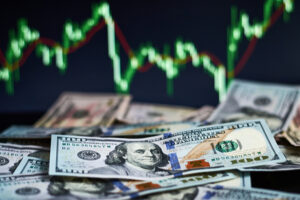The dollar is on the rise, and the yen with the biggest loss since 1971.
For the first time in two years, the dollar index reached 101 points on Tuesday, which may be influenced by rising yields US treasury bonds and expectations for a series of interest rate hikes in the US.
Known for his hawkish views, James Bullard, president Federal Reserve from St. Louis, said on Monday that US inflation was far too high and made arguments in favor of raising interest rates to 3,5%. by the end of this year.
Will the Fed accelerate interest rate hikes?
Last month, the Fed raised its target rate by 25 basis points, and the forecasts released at the time indicated that interest rates could rise to 1,9% by the end of the year.
Bullard's preferred path would require a rate hike of half a percentage point at all six other Fed meetings this year. There was also a statement in his statements that interest rates may rise by 75 basis points to accelerate the entire cycle of monetary policy tightening.
From a monetary policy perspective, there may be a strong divergence between the Fed's actions and the rest of the central banks, incl Bank of Japan. This, in turn, can translate into currency rates, including pairs USD / JPYwhich reaches 128 yen per dollar.
Yen weakness benefits exporters
From the beginning of the year, the yen may have lost 10 percent to the USD, and in April alone, more than 5 percent. In this situation, as it calculates BloombergThe yen seems to have lost the most versus the dollar since 1971. Although the Japanese finance minister tried to intervene verbally in the currency market, this may not have brought much comfort to the USD / JPY rate.
The weak yen could theoretically help the Japanese economy raise the inflation rate due to more expensive imports of products from abroad. It can support Japanese producers who export their goods, potentially increasing their competitiveness. For Japan, the current situation can therefore be quite comfortable. Only when inflation got out of control would be an undesirable phenomenon.
SNB limits the appreciation of the franc
USD / CHF exchange rate recorded a 12-month high as this pair may be under pressure from the strong dollar despite potential interventions Bank of Switzerland. Overnight deposits with the SNB increased by CHF 2,2bn in the week ended April 8 compared to the previous week, after an increase of CHF 5,7bn in the previous week.
The increase in deposits is commonly viewed as an indicator of central bank foreign exchange interventions to dictate the amount of credit added to the accounts of commercial banks that hold newly formed francs in exchange for foreign currency. At the last meeting, the SNB emphasized that it would limit the appreciation of the franc, which is close to the 7-year high against the euro. This level was achieved after Russia's invasion of Ukraine.






















![Forex Club – Tax 9 – Settle tax on a foreign broker [Download the Application] Forex Club - Tax 9](https://forexclub.pl/wp-content/uploads/2024/02/Forex-Club-Podatek-9-184x120.jpg?v=1709046278)
![Trading View platform – solutions tailored to the needs of traders [Review] trading view review](https://forexclub.pl/wp-content/uploads/2024/03/trading-view-recenzja-184x120.jpg?v=1709558918)
![How to connect your FP Markets account to the Trading View platform [Guide] fp markets trading view](https://forexclub.pl/wp-content/uploads/2024/02/fp-markets-trading-view-184x120.jpg?v=1708677291)
![How to invest in ChatGPT and AI? Stocks and ETFs [Guide] how to invest in chatgpt and artificial intelligence](https://forexclub.pl/wp-content/uploads/2023/02/jak-inwestowac-w-chatgpt-i-sztuczna-inteligencje-184x120.jpg?v=1676364263)


![WeWork – the anatomy of the collapse of a company valued at $47 billion [WeWork, part II] wework bankruptcy story](https://forexclub.pl/wp-content/uploads/2024/04/wework-bankructwo-historia-184x120.jpg?v=1711729561)
![Adam Neumann – the man who screwed up Softbank [WeWork, part AND] adam neumann wework](https://forexclub.pl/wp-content/uploads/2024/04/adam-neumann-wework-184x120.jpg?v=1711728724)





![How to transfer shares to another brokerage office [Procedure description] how to transfer shares to another brokerage house](https://forexclub.pl/wp-content/uploads/2024/03/jak-przeniesc-akcje-do-innego-biura-maklerskiego-184x120.jpg?v=1709556924)

![The most common mistakes of a beginner trader - Mr Yogi [VIDEO] Scalping - The most common mistakes of a beginner trader - VIDEO](https://forexclub.pl/wp-content/uploads/2024/03/Scalping-Najczestsze-bledy-poczatkujacego-tradera-VIDEO-184x120.jpg?v=1711601376)
![Learning patience: No position is also a position - Mr Yogi [VIDEO] Scalping - Learning patience - No position is also a position - VIDEO](https://forexclub.pl/wp-content/uploads/2024/03/Scalping-Nauka-cierpliwosci-Brak-pozycji-to-tez-pozycja-VIDEO-184x120.jpg?v=1710999249)
![When to exit a position and how to minimize losses - Mr Yogi [VIDEO] Scalping - When to exit a position and how to minimize losses - VIDEO](https://forexclub.pl/wp-content/uploads/2024/03/Scalping-Kiedy-wyjsc-z-pozycji-i-jak-minimalizowac-straty-VIDEO-184x120.jpg?v=1710336731)

















